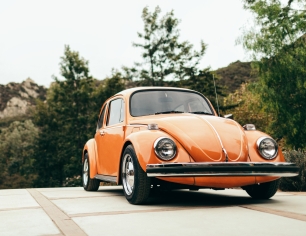Classic car storage 101
Some owners use their classic cars more than others, but many store their classic for most of its life and drive it only occasionally. Storing your classic car the right way will help you avoid rust, rodents, and abnormal wear and tear on your vehicle. Plus, proper storage will help retain the value of your car and keep it eligible for coverage under a classic car insurance policy.
Explore Progressive Answers' auto editorial guidelines to find out why you can trust the car insurance information you find here.
How to store a classic car
If you'll be storing your classic for long periods of time, especially more than three months, many experts agree that you should aim to follow these tips for how to store your classic car. You may also consider researching the recommended practices for your specific make and model — local and national classic car clubs may be helpful resources:
Location, location, location
- Store your classic in a dry, climate-controlled, secure facility, such as a private garage or storage unit, to protect it from thieves and the elements
- Wash the concrete where you're storing your classic car with a degreasing cleaner
- Place a plastic vapor barrier on top of the concrete to prevent moisture from the ground from getting into the vehicle's undercarriage, which can cause rust. Seal the edges of the plastic to the concrete and put a cloth or canvas on top of the plastic.
- Apply mouse/rat deterrent and stations under and around the car, and put steel wool in the exhaust pipes and air cleaner snorkel if rodents are a real problem
To gas up or not to gas up
There's some debate over keeping gas in the vehicle. The safest action is to drain the fuel tank as much as possible before storage, but some experts say you can fill the tank with recreational fuel, add a stabilizer, and drive it a few miles before storing your classic car.
Clean up & secure the car
- Wash, wax, and buff the car before long-term storage — be sure to rinse off any remaining salt or dirt from the undercarriage (get more tips on how to wash a classic car)
- Clean and vacuum the inside, and close convertible tops
- Remove the wiper blades, and wrap the wiper arms to protect the windshield
- Leave small boxes of baking soda inside the car and trunk to deodorize it
- Use tire chocks instead of the parking brake — brake pads, rotors or drums can rust together when you keep the parking brake on
- If the car is being worked on, rest it on jack stands with a plastic tarp underneath the car
Can you store a classic car in an unheated garage?
It's not ideal but storing classic cars in a garage with no heat is better than storing them somewhere more exposed to the elements. Any garage can also help deter theft. If your classic will be stored in an open-air carport, avoid surfaces that trap humidity like grass and dirt.
Prep the engine and other systems
- Ensure fluid tank contents are full and fresh (transmission, coolant, brake, power steering, windshield wiper)
- Check your coolant's freezing point with a hydrometer or test strips to ensure you're good for the lowest of winter temperatures in your region
- Experts recommend changing the oil and oil filter and driving the car for a dozen miles or so until the fresh oil is fully worked into the car's systems
- Unhook the battery cables or attach a battery tender to ensure your car can start and your clock and radio settings remain — just don't use a plain old trickle charger (they're a potential fire hazard)
- Fill the tires so they're full or slightly overinflated to prevent flat spots from forming while your classic car is in storage
When you've completed the rest of your preparation, place a fitted breathable cotton or flannel cover on the exterior. A cover will help to keep spills, dust, and falling objects from damaging the paint on your vehicle while it's in storage.
Storing a classic car for more than six months may require additional precautions, such as putting your vehicle on jack stands, draining some of the fluids, and oil flogging the engine.
Keep moisture out
Moisture is often cited as the worst enemy of classic cars in storage. To keep your storage space dry, consider adding a dehumidifier to the space. You'll need to check it regularly and empty the reservoir bin often. Also, a container of baking soda and/or moisture-absorbing desiccant bags can help keep the interior fresh and prevent mildew.
Do insurance companies have guidelines for how to store a classic car?
Yes, insurers often have guidelines for storing a classic car. Proving you follow their guidelines can help you qualify for a classic car insurance policy and a better rate (and also helps maintain your classic car's value).
Progressive Classic Car by Hagerty prefers that your classic vehicle is stored in a:
- Private garage
- Storage unit
- Pole barn (a type of post-frame building that allows for significant open space on the inside)
All other factors being equal, these ways of storing your antique vehicle can lead to a better car insurance rate. There may also be considerations for carports, driveways, parking garages, and car hauling trailers.*
If you won't be driving your car for an extended period, find out if you need insurance for a car in storage.
Looking to get the right insurance coverage for your classic car? Quote classic car insurance online or call 1-888-534-8980 to speak with a representative from Progressive Classic Car by Hagerty.

Get a free quote for classic car insurance today
Learn more about classic car insurance policies.









